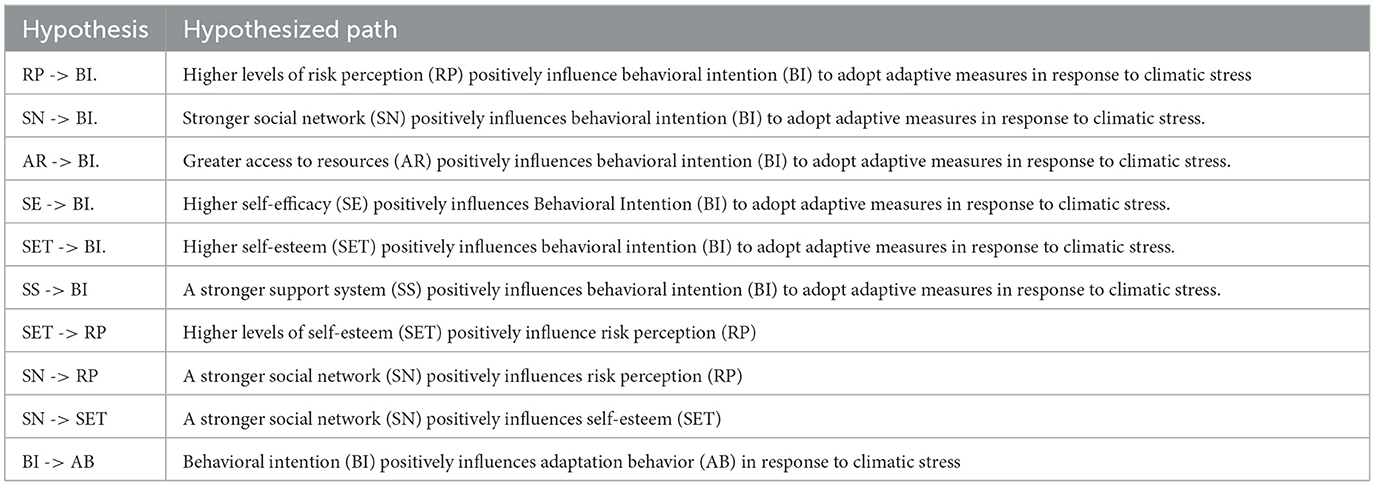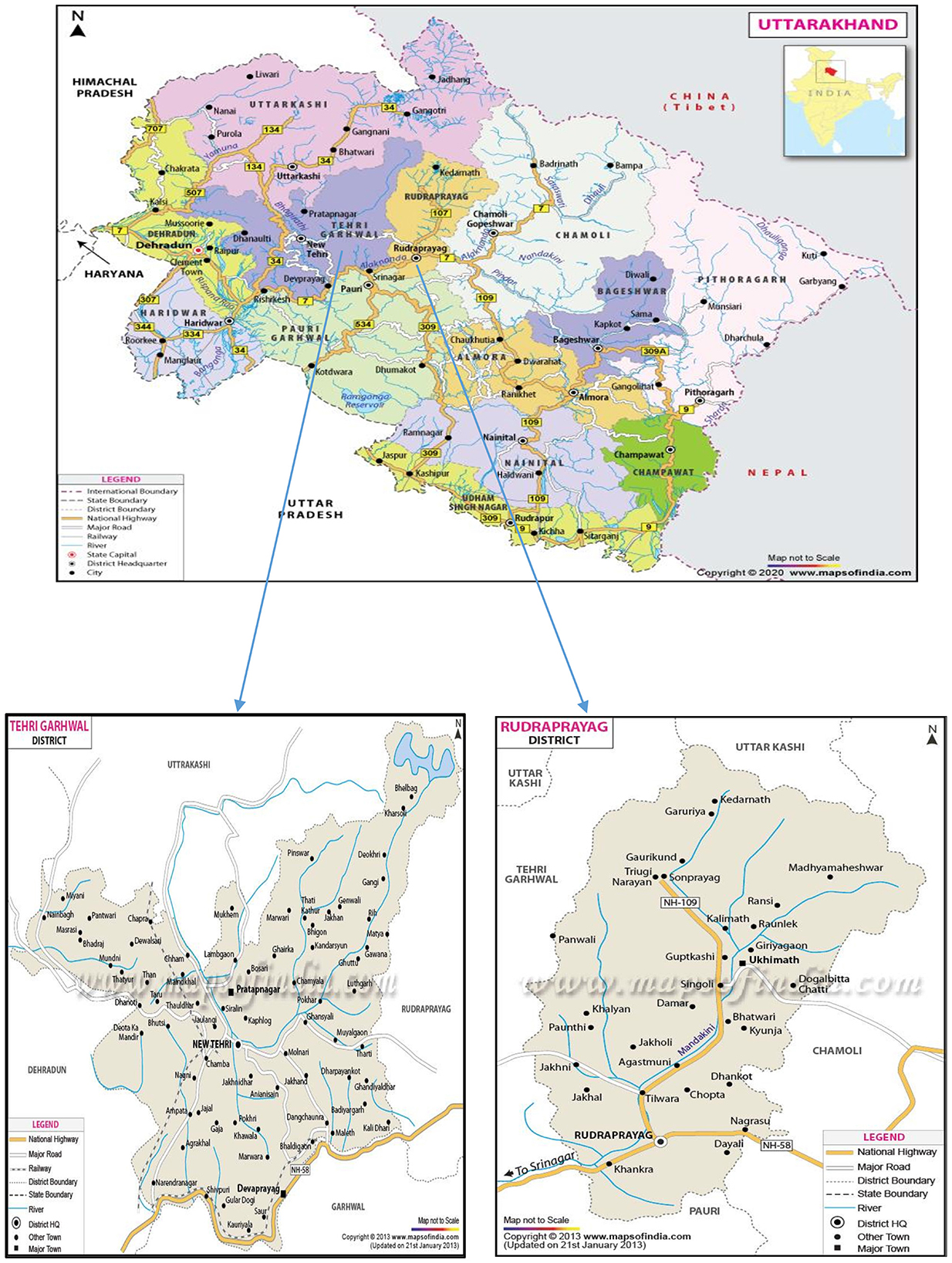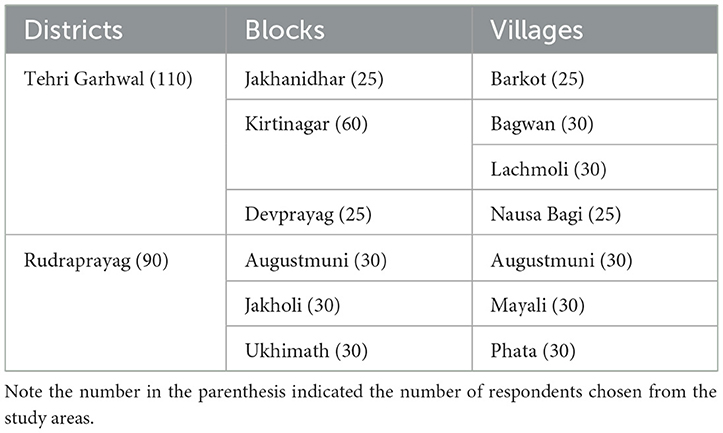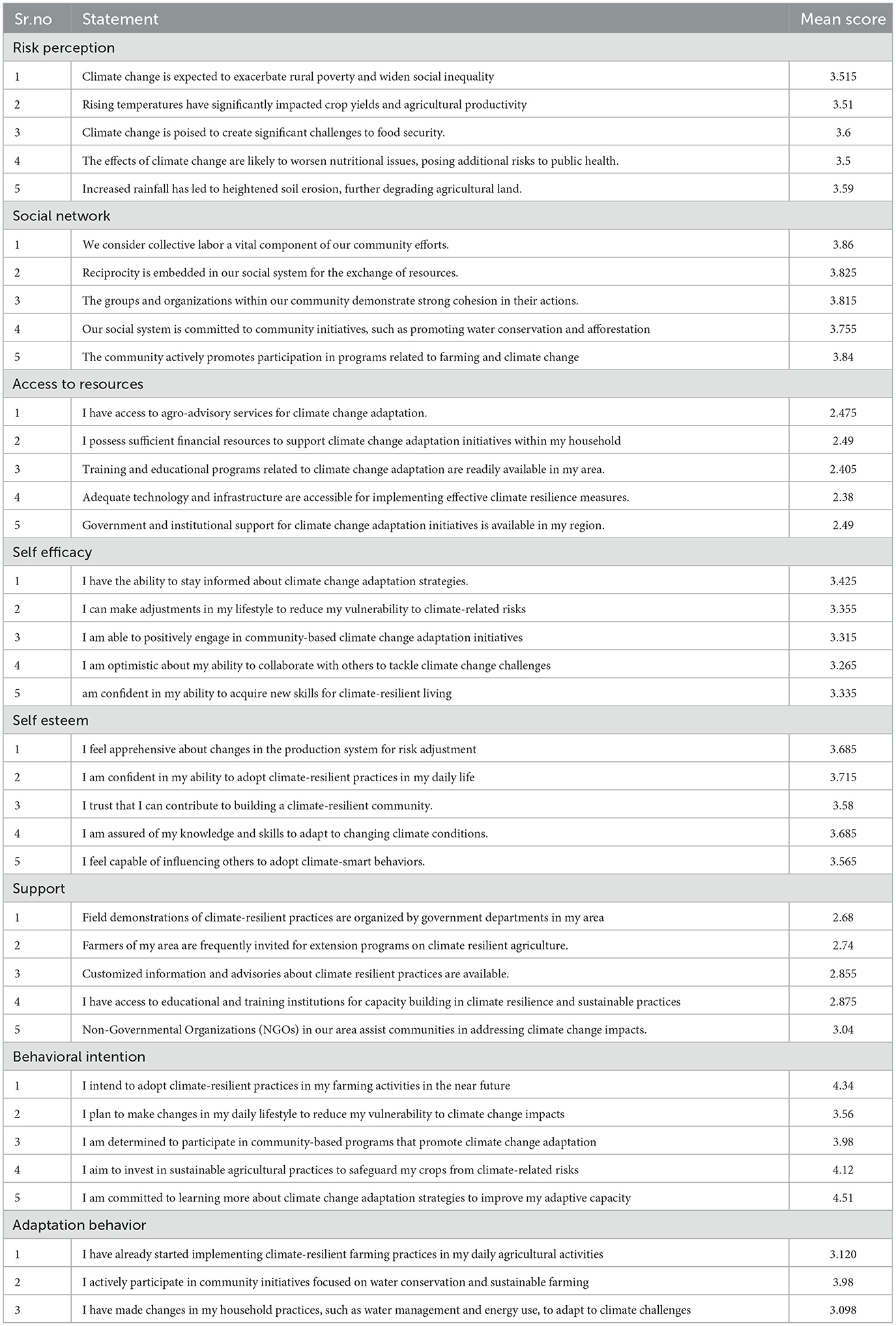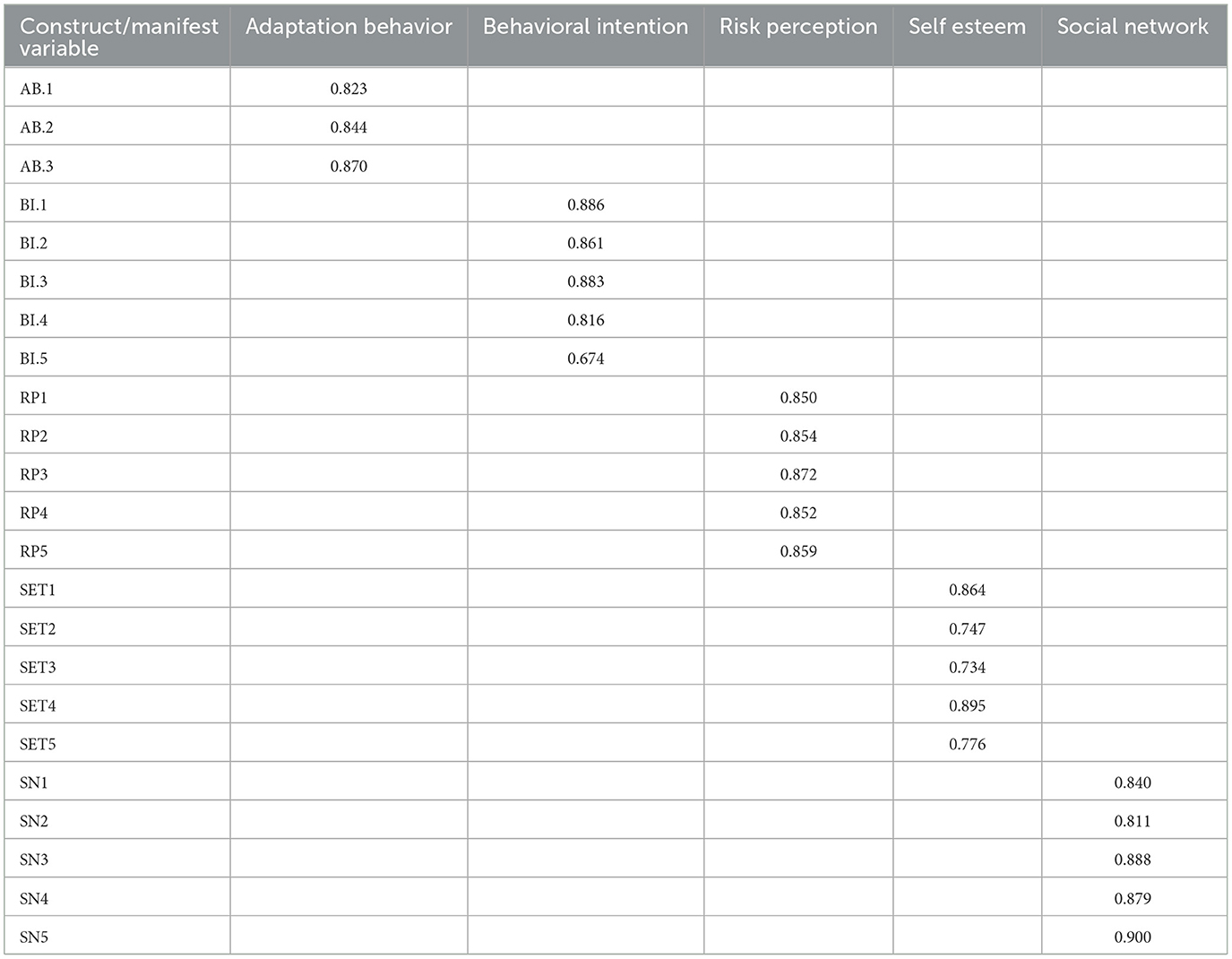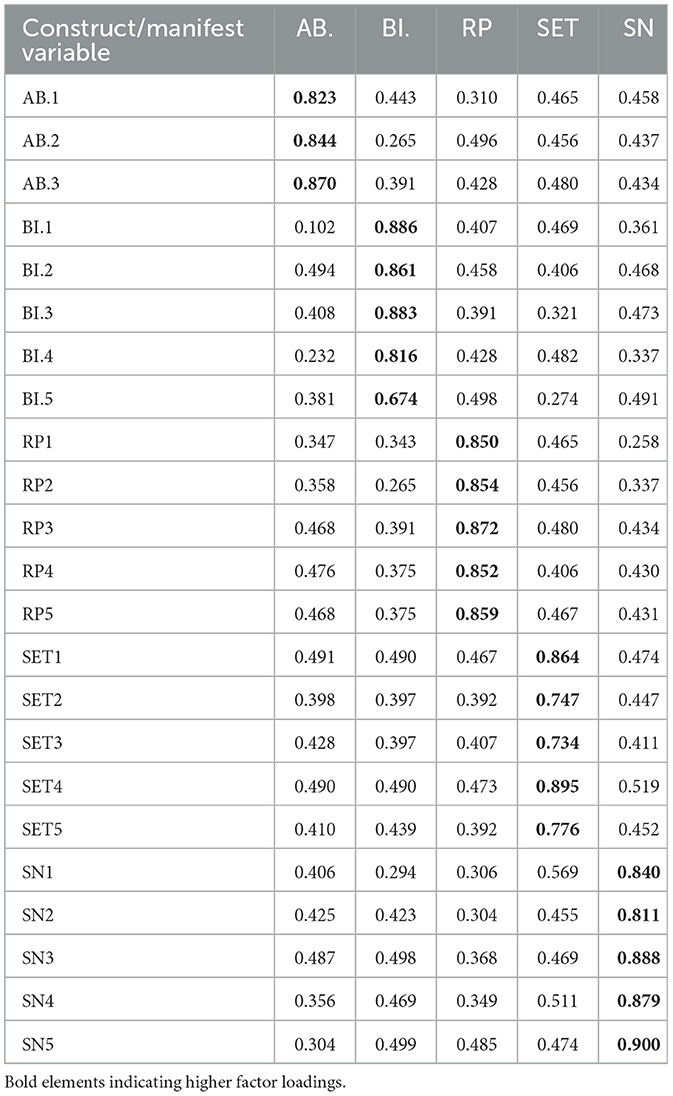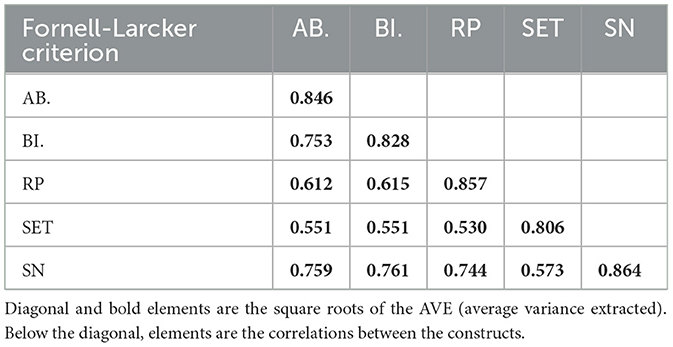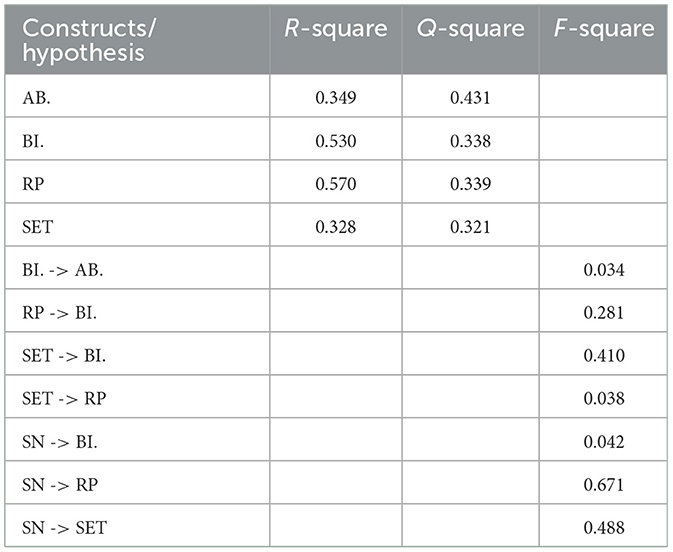- 1Division of Agricultural Extension, ICAR-Indian Agricultural Research Institute, New Delhi, India
- 2Transfer of Technology Unit, ICAR-Central Institute for Research on Buffaloes, Hisar, Haryana, India
- 3Division of Statistical Ecology and Environmental Statistics, ICAR-Indian Agricultural Statistics Research Institute, New Delhi, India
- 4Division of Agricultural Economics, ICAR- Indian Agricultural Research Institute, New Delhi, India
- 5ICAR-National Research Centre on Camel, Bikaner, Rajasthan, India
- 6Directorate of Extension Education, Bihar Agricultural University, Bhagalpur, Bihar, India
Women in Uttarakhand are particularly vulnerable to the impacts of climate change due to limited access to resources, land ownership, and decision-making power. These vulnerabilities are further intensified by the region's mountainous landscape, which is highly susceptible to climatic disturbances such as erratic rainfall, temperature fluctuations, and landslides. As key contributors to household welfare and agricultural activities, rural women's adaptive behaviors play a critical role in mitigating climate-related risks and fostering community resilience. This paper investigates climate change ABs among rural women in Uttarakhand, India, within the framework of the Theory of Planned Behavior (TPB). A multistage sampling approach was employed, with purposive selection of two districts—Tehri Garhwal and Rudraprayag—identified as highly vulnerable to climate change. The study examines the relationships between perceived behavioral control (PBC), subjective norms, and attitudes by employing Partial Least Square Structural Equation Modeling (PLS-SEM), exploring their influence on women's intention to adopt adaptation strategies. The findings indicate that PBC, risk perception (RP), and social norms (SN) significantly influence behavioral intention (BI) and adaptation behavior (AB). The analysis revealed that RP and PBC are major predictors of BI to adopt climate adaptation practices, with significant impacts from SN and self-efficacy beliefs. The results emphasize the critical role of social and psychological factors in shaping the climate adaptation decisions of rural women, highlighting the need for gender-sensitive interventions that foster empowerment and access to resources. The study also demonstrates the effectiveness of the TPB framework in understanding rural women's ABs in Uttarakhand and suggests that enhancing women's control over resources and fostering supportive SN can significantly improve their climate resilience. Future research should explore the application of TPB in broader rural contexts, with particular emphasis on empowering women through policy support, education, and community engagement to promote sustainable adaptation strategies in climate-vulnerable regions.
1 Introduction
Global efforts to address climate change, including the United Nations Framework Convention on Climate Change (UNFCCC) and the Sustainable Development Goals (SDGs), underscore the need to understand how local communities experience vulnerability and build adaptive responses. Such understanding is essential for designing effective, contextually grounded strategies to mitigate the adverse effects of climate variability. According to the Intergovernmental Panel on Climate Change (IPCC, 2014), adaptation entails adjustments in natural or human systems in response to actual or expected climate stimuli, aimed at moderating harm or exploiting beneficial opportunities. These responses span behavioral, institutional, and structural changes, encompassing shifts in livelihood strategies, land use, and ecosystem management (Gupta et al., 2022; Sultana et al., 2023; Hossain et al., 2018).
While adaptation research has traditionally emphasized technological and ecological dimensions, increasing scholarly attention is now directed toward the social drivers of vulnerability and adaptive capacity (Adger and Kelly, 1999; Raymond and Robinson, 2013). Gender, in particular, has emerged as a critical axis along which climate impacts are experienced and negotiated. Women, especially in agrarian settings, are often disproportionately affected by climate change due to their reliance on natural resources and their constrained access to land, finance, education, and institutional support systems (Perez et al., 2015; Hackfort and Burchardt, 2018; Ngigi et al., 2017). However, framing women solely as victims risks obscuring their agency and the complex socio-cultural and economic structures that shape adaptation processes.
Feminist political ecology critiques such reductionist framings, advocating for a more nuanced exploration of how gender intersects with other social identities and power relations to shape adaptation pathways (Mollett and Faria, 2013; Goldman et al., 2018; Carey et al., 2016). This perspective challenges the essentialist portrayal of women as a uniform group, emphasizing instead the heterogeneity within gender categories shaped by caste, class, age, marital status, and household roles (Kabeer, 2003; Bürkle, 2023; Sultana, 2014). Recent empirical work reveals that adaptive behaviors are not only gendered but also shaped by overlapping and often unequal social positions. For instance, women's strategies in coping with water scarcity, livelihood shifts, or resource management are mediated by household structure, life stage, social capital, and access to information (Rakib et al., 2017; Haeffner et al., 2018; Gautier et al., 2016).
Intersectionality theory, originally articulated by Crenshaw (1991), offers a powerful conceptual framework for analyzing how multiple forms of social stratification interact to shape individual and collective vulnerability. Applied to climate adaptation, this framework enables a deeper understanding of how social identities intersect with institutional and structural forces to shape behavioral responses to environmental risks (Thomas et al., 2019; Kaijser and Kronsell, 2014; Wolf and Moser, 2011). Yet, despite its theoretical potential, empirical applications of intersectionality in behavioral climate research remain underdeveloped. Particularly lacking are studies that connect intersectional insights with models that explain why individuals act the way they do in the face of climate stress.
In this context, behavioral science offers valuable theoretical tools. Among these, the Theory of Planned Behavior (TPB) has gained prominence for its ability to predict and explain individual actions based on attitudes, subjective norms, and PBC (Ajzen, 1991). TPB has been successfully applied in environmental behavior studies, accounting for a substantial portion of variance in adaptation-related decisions (Gansser and Reich, 2023; Arora and Sahney, 2018; Leng et al., 2011). However, its traditional formulation often overlooks structural inequalities, psychosocial stressors, and local cultural dynamics—factors particularly relevant to women in marginal agrarian settings (Prasad, 2024; Ahmed et al., 2025; Elkins, 2022).
To enhance TPB's contextual relevance, scholars have proposed extended models that incorporate situational and affective variables, thereby offering a more holistic understanding of decision-making in high-risk, resource-constrained environments (Gansser and Reich, 2023; Sapry and Ahmad, 2024). Nevertheless, few studies have attempted to integrate intersectionality with TPB to examine how adaptive intentions among women are shaped not just by internal motivations but also by external structures of constraint and opportunity.
This study addresses that gap by applying an extended TPB framework to examine climate adaptation behaviors (ABs) among rural women in Uttarakhand, India. The region's ecological fragility, combined with deep-rooted gender asymmetries and socio-economic marginalization, presents a compelling case for analyzing how behavioral intentions (BIs) are shaped by intersecting identities and psychosocial dynamics.
2 Research objectives
1. To examine how behavioral factors, shaped by intersecting social identities, influence the climate adaptation decisions of rural women in Uttarakhand.
2. To explore how the TPB can be expanded to incorporate contextual and psychosocial challenges unique to gendered agrarian environments.
This approach contributes to ongoing efforts to develop empirically grounded, theoretically robust frameworks that capture the complexity of adaptive decision-making in climate-vulnerable communities. It offers both conceptual refinement and practical relevance by linking behavioral theory with intersectional insights in climate adaptation research.
2.1 Theoretical framework and hypothesis
This study employs the TPB, formulated by Icek Ajzen in 1991, to examine the psychological determinants driving rural women's ABs in response to climate change. Unlike focusing solely on adaptive capacity, this research emphasizes intentions to adapt, as intentions are pivotal in shaping actual behaviors (Ajzen, 1991). TPB, an extension of the Theory of Reasoned Action, explains behavior as a function of three key constructs: attitudes toward the behavior, subjective norms, and PBC. According to TPB, an individual's attitude reflects their beliefs about the potential outcomes of engaging in a behavior. Positive attitudes emerge when individuals perceive the outcomes as beneficial, aligning with the concept of “Outcome Efficacy,” which addresses the question, “Will my action bring positive consequences?” (Van Valkengoed and Steg, 2019). Social norms (SN), another critical component, pertain to the influence of others, including family, peers, and agricultural stakeholders, on an individual's decision-making process. Social norms are categorized into injunctive norms, which consider others' approval or disapproval, and descriptive norms, which reflect others' likely actions. For rural women, these social influences might include family members, farmer groups, neighbors, agricultural extension officers, and product collectors. Perceived behavioral control, the third pillar of TPB, denotes an individual's belief in their ability to perform a specific behavior, considering the availability of resources, knowledge, and external support. This construct aligns closely with self-efficacy, which captures confidence in successfully undertaking adaptive actions. Together, these components drive BIs, ultimately influencing actual ABs when individuals perceive sufficient control over their circumstances. In the context of climate change adaptation, BI represents a woman's motivation to employ strategies aimed at mitigating climate-related impacts. Adaptation behavior encompasses both traditional practices and innovative actions that address challenges to livelihoods, households, and communities. TPB framework provides a comprehensive understanding of rural women's responses to climate change by integrating psychological, social, and resource-based perspectives.
2.2 Constructs under study
The AB of rural women, as conceptualized in this study, involves multiple interconnected constructs within the TPB framework (Figure 1):
1. Risk Perception (RP): This construct addresses how rural women evaluate climate-related risks, shaping their motivation to adapt
2. Social Network (SN): Social connections play a crucial role in facilitating information exchange and access to resources necessary for climate resilience
3. Access to Resources (AR): The availability of tools, financial support, and knowledge enables rural women to implement effective adaptive strategies
4. Self-Efficacy (SE): Confidence in executing adaptation strategies is a vital psychological enabler
5. Self-Esteem (SET): Resilience and willingness to act are influenced by self-esteem
6. Support System (SS): Both formal and informal networks offer essential guidance and resources for effective adaptation
7. Behavioral Intention (BI): Motivation to engage in adaptive actions is shaped by attitudes, SN, and PBC
8. Adaptation Behavior (AB): The actual strategies employed, blending traditional knowledge with innovative practices, to reduce climate-related impacts
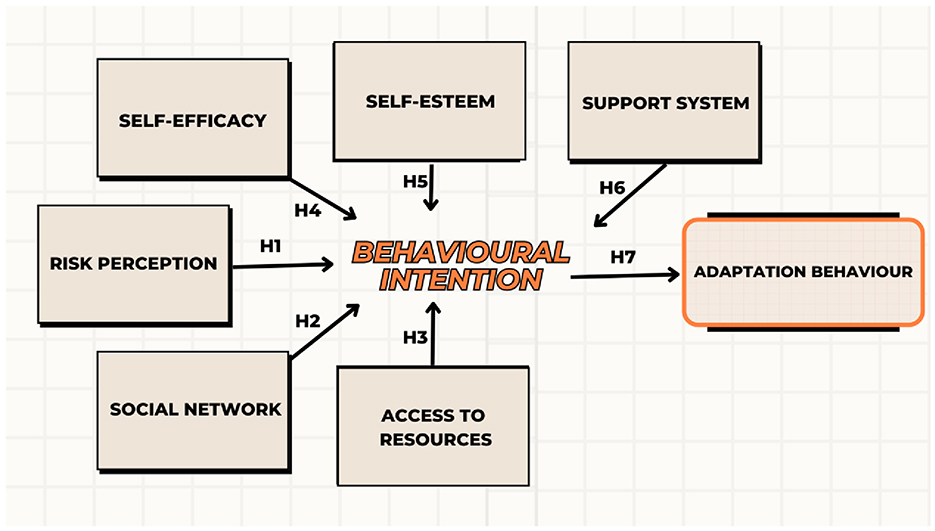
Figure 1. The extended TPB model to explain determinants of respondent's adaptation behavior in response to climate change.
This study aims to examine the following hypotheses by utilizing the TPB as given in the Table 1 below.
3 Materials and methods
3.1 Locale of study
Uttarakhand, a northern Indian state located within the Central Himalayan Region, spans an area of 53,483 km2. The state's geographical coordinates range from 28° 43′ to 31° 27′ N latitude and 77° 34′ to 81° 02′ E longitude. Approximately 80% of its terrain is hilly, while the remaining consists of plains (Rawat, 2023). Forests dominate about 65% of the land, harboring rich biodiversity, including rare medicinal and aromatic plants. The state is also home to the origins of the Ganga and Yamuna rivers, highlighting its abundant water resources. Uttarakhand experiences diverse climatic conditions, from tropical climates in the foothills to alpine climates at higher altitudes. The average annual rainfall ranges between 1,500 mm and 1,900 mm (Rawat, 2023). Agriculture, particularly terrace farming, is the primary livelihood for over three-quarters of the rural population, benefiting from the region's favorable climate and natural resources. Rural women play a significant role in agriculture and livestock rearing, making them especially vulnerable to climatic changes due to their direct dependence on natural resources. The state's unique location within the sensitive Himalayan hotspot makes it particularly susceptible to climate change impacts. Uttarakhand faces challenges such as melting glaciers, erratic rainfall, and frequent natural hazards like landslides, floods, and land subsidence. These issues are exacerbated by the mountainous terrain and extensive forest cover. Climatic patterns influenced by monsoons and local geography exhibit distinct seasonal variations across its diverse topography, ranging from the Tarai plains to alpine Himalayan regions (Sati, 2020). In recent years, Uttarakhand has witnessed a decline in rainfall and a pronounced warming trend, particularly in mountainous districts, accelerating glacier melting and increasing the frequency of climate-induced disasters. Notable events include the Kedarnath flood in 2013 and the recent land subsidence in Joshimath. The Hindu Kush Himalayan region, which includes Uttarakhand, is projected to experience a temperature rise of up to 5.2°C by the century's end, leading to reduced snowfall and glacier retreat. These changes threaten essential water resources, including around 260,000 springs that serve as vital drinking water sources (Sati, 2015). Human activities, such as rapid urbanization, further disrupt the region's ecological balance, intensifying vulnerabilities. Given its climatic sensitivity and reliance on rainfed agriculture, the state serves as a critical region for exploring sustainable and adaptive strategies to address the impacts of climate change (Figure 2).
3.2 Sampling and data collection
A multistage sampling approach was employed to evaluate climate change ABs among rural women in Uttarakhand, using the TPB as the guiding framework. In the first stage, Tehri Garhwal and Rudraprayag districts were purposively selected based on their high vulnerability to climate change (Shukla et al., 2016). The Uttarakhand Human Development Report (Government of Uttarakhand, 2016) classified Tehri Garhwal as having “very high” vulnerability and Rudraprayag as “moderately” vulnerable, using a composite index of socio-economic and environmental indicators. INRM Consultants, utilizing CORDEX regional climate data, ranked Tehri as “very highly vulnerable” and Rudraprayag as “moderately vulnerable” across multiple sectors. Additionally, the ISRO-NRSC Landslide Atlas of India [Indian Space Research Organisation-National Remote Sensing Centre (ISRO-NRSC), 2023] ranked Rudraprayag and Tehri Garhwal as the first and second most landslide-prone districts in India, respectively, indicating their exposure to geophysical hazards exacerbated by climate variability. In the second stage, six blocks were randomly chosen: Devprayag, Kirtinagar, and Jakhanidhar from Tehri Garhwal, and Agastyamuni, Jakholi, and Ukhimath from Rudraprayag. Finally, respondents were selected from specific villages within these blocks. From Tehri Garhwal 110 rural women respondents were randomly selected, 25 from Barkot village (Jakhanidhar Block), 60 from Kirtinagar Block —Bagwan village (30) and Lachmoli village (30) and 25 from Nausa Bagi village (Devprayag Block). From Rudraprayag district 90 rural women respondents were randomly selected, 30 each from Augustmuni village (Agustmuni Block), Mayali village (Jakholi Block), and Phata village (Ukhimath Block) were interviewed, and resulting in a total sample size of 200 rural women farmers (Table 2).
The sample size exceeds the minimum recommended threshold for Partial Least Square Structural Equation Modeling (PLS-SEM), which requires 10 times the maximum number of structural paths directed at any construct in the model. According to Hair et al. (2017b), this “10-times rule” provides a conservative estimate for minimum sample size. Given the complexity of the extended TPB framework used in the study, the sample of 200 is sufficient for robust statistical power and model stability. Thus, the sampling frame captures both depth and representativeness, aligning with the analytical requirements of PLS-SEM.
3.3 Measuring instrument and data collection
A structured interview schedule was developed based on the study objectives, literature review, and expert consultations. Insights from seven subject-matter experts were incorporated to ensure content validity and comprehensive coverage of key dimensions. A pilot study involving 100 rural women from Mathura (U.P.) and Nuh (Haryana) was conducted to assess the clarity, relevance, and applicability of the items. The development process included item generation and editing based on Edward's criteria, whereby 8 statements were framed under each variable and critically evaluated for clarity, relevance, conciseness, and avoidance of ambiguity or double-barrelled phrasing, ensuring each statement's direct relation to the constructs. Following expert review, field testing was conducted by administering a set of 64 statements to 100 SHG women respondents using a five-point Likert scale (strongly agree to strongly disagree with respective weights of 5 to 1) to judge the discriminatory power of each statement. Item analysis was then performed using a t-test comparing the mean scores of the top 25% and bottom 25% scoring
respondents, and 40 statements with a t-value >1.75 were retained for the final scale. The finalized structured interview schedule, aligned with the TPB, was used for data collection through personal interviews, with the measured variables detailed in Table 3.
4 Methodology
The collected data were entered into a Microsoft Excel spreadsheet and analyzed using SMART PLS software, utilizing the PLS-SEM approach. Structural Equation Modeling (SEM) enables the analysis of multiple relationships between dependent and independent variables, and has become increasingly central to research in the social and behavioral sciences (Benitez et al., 2020), due to its flexibility and improved handling of measurement error (Hooman, 2014). Two primary SEM approaches exist: covariance-based SEM (CB-SEM) and variance-based SEM (PLS-SEM). In this study, we employed variance-based SEM, specifically Partial Least Squares Path Modeling (PLS-PM), using SMART PLS and R software. PLS-PM is well-suited for predictive modeling, theory development, and situations involving complex models, smaller sample sizes, or data that violate normality assumptions (Seyyed Abbaszadeh et al., 2012; Henseler et al., 2016).
Partial Least Square Structural Equation Modeling models consist of two components: the structural (inner) model, which captures relationships among latent constructs, and the measurement (outer) model, which links latent variables to their corresponding manifest indicators. In the present study, all latent constructs were modeled using reflective measurement models, i.e., each latent variable was assumed to cause the variation in its observed indicators, and the indicators were expected to be correlated (Hair et al., 2021). Constructs such as BI, Adoption Behavior (AB), Subjective Norms (SN), RP, and Self-Efficacy and Trust (SET) were each measured reflectively through multiple indicators derived from validated scales. Accordingly, validity and reliability of the reflective measurement models were evaluated using criteria such as indicator reliability (outer loadings >0.7), internal consistency reliability (Cronbach's alpha and Composite Reliability), convergent validity [Average Variance Extracted (AVE) >0.5], and discriminant validity (using the Fornell-Larcker criterion and HTMT ratios). Latent variables, which represent abstract theoretical concepts such as perceived institutional trust or BI, were inferred through observable indicators such as clarity of roles or willingness to comply. These manifest variables play a crucial role in understanding the underlying constructs and identifying the most influential factors (Abugre and Sackey, 2022). The combination of inner and outer models in PLS-PM facilitated a robust analysis of the conceptual framework and helped pinpoint the key drivers and interrelationships among the studied variables.
5 Results
The analysis followed a two-stage approach using PLS-SEM. The first stage involved testing the measurement model to ensure that the constructs were valid and reliable. In the second stage, the structural model was evaluated to test the hypothesized relationships and their practical implications. This section narrates both the empirical validation and interpretation of the model, connecting directly with the hypotheses framed in Table 1.
5.1 Assessment of initial measurement model to establish the relationship among variables
5.1.1 Initial model-measurement model
In structural equation modeling, the measurement model (also referred to as the outer model) captures the relationship between latent variables (depicted as circles) and their observed indicators (rectangles), whereas the structural model (inner model) represents the hypothesized relationships among latent constructs themselves (Hair et al., 2017b). Figure 3 illustrates the initial model encompassing eight latent constructs, with directional arrows indicating standardized path coefficients between constructs and p-values between constructs and indicators. Composite reliability values are indicated inside the respective latent variables. As part of the model evaluation, reliability, convergent validity, and discriminant validity of the constructs were assessed following the guidelines of Wardrop and Loehlin (1987). The initial model revealed inadequate convergent validity for three constructs—Access to Resources (AR), Self-Efficacy (SE), and Support System (SS)—which exhibited Average Variance Extracted (AVE) values of 0.28, 0.13, and 0.01, respectively. Since AVE values below the 0.50 threshold indicate insufficient explanatory power of the indicators (Fornell and Larcker, 1981), these constructs were excluded from subsequent analysis to enhance model robustness.
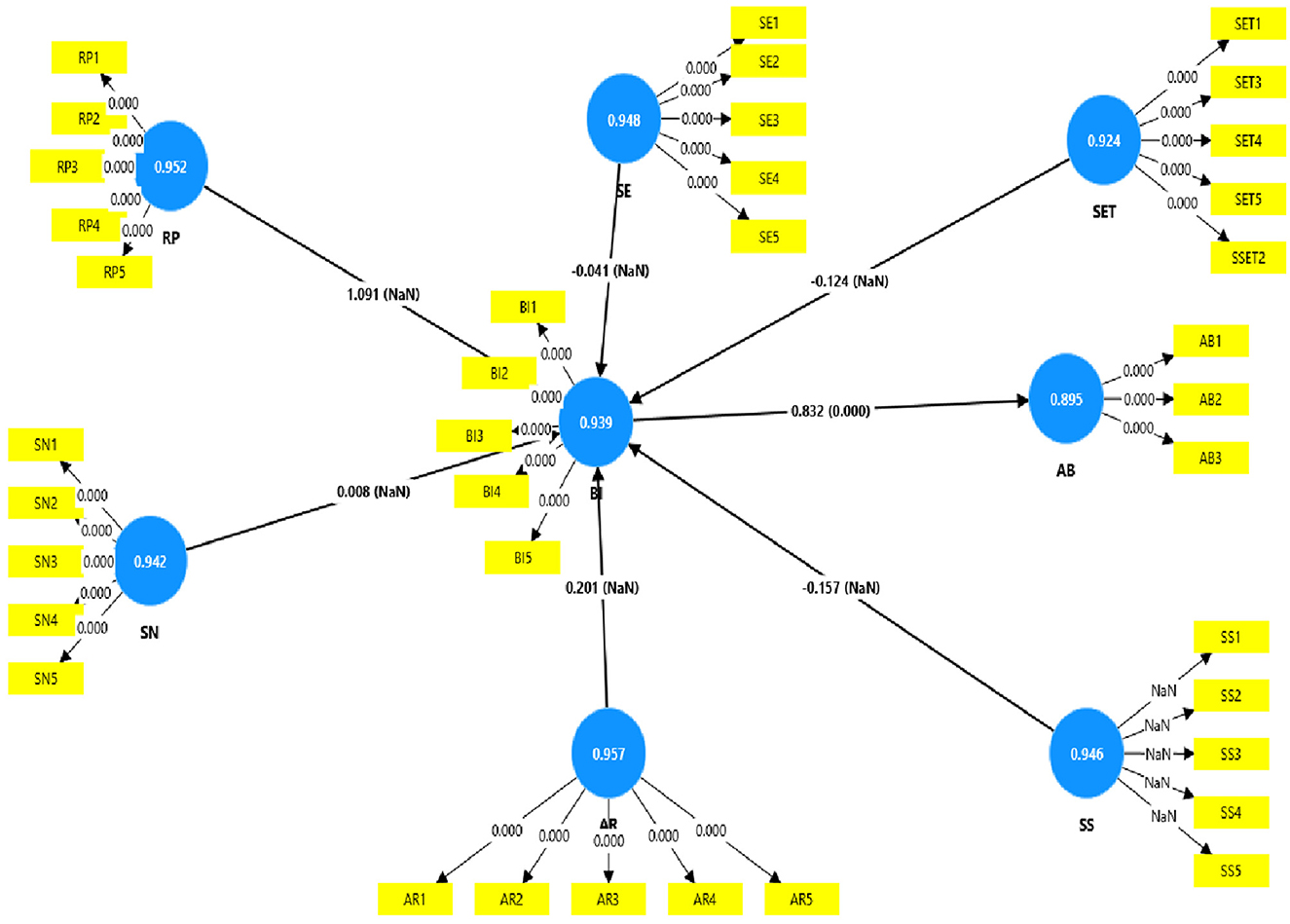
Figure 3. Partial Least Squares Structural Equation Modeling (PLS-SEM) of initial model with eight constructs. Circles are latent variables, rectangles are manifest variables. The numbers on the arrows from each latent variable to manifest variables are p-values. The numbers on the arrows between the latent variables are the path coefficients. The numbers inside the circles represent composite reliability.
A revised model was then specified, retaining the five constructs with acceptable psychometric properties: RP, Social Network (SN), Self-Esteem (SET), BI, and AB. This refined structure formed the basis for further reliability analysis and structural path testing.
5.2 Assessment of modified measurement model in PLS-SEM
In order to ensure the robustness of the modified measurement model, we evaluated its psychometric properties using several criteria, including reliability, convergent validity, and discriminant validity. This evaluation was based on accepted thresholds from existing literature (Hair et al., 2014; Fornell and Larcker, 1981; Nunnally and Bernstein, 1994).
5.2.1 Reliability
Reliability assesses the internal consistency of the indicators that measure each construct. Two metrics were used: Cronbach's Alpha and Composite Reliability (CR). All constructs exhibited Cronbach's Alpha values ranging from 0.883 to 0.937, well above the recommended threshold of 0.70, indicating high internal consistency (Fornell and Larcker, 1981). Composite reliability values (ρc) also ranged from 0.884 to 0.938, again satisfying the benchmark recommended by Nunnally and Bernstein (1994). These results, summarized in Table 5, confirm that each construct is reliably measured.
5.2.2 Convergent validity
Convergent validity examines whether indicators of a construct converge in measuring the same underlying concept. This is assessed by evaluating three metrics: factor loadings, composite reliability, and average variance extracted (AVE). All individual indicator loadings exceeded the minimum cut-off value of 0.50 (Hair et al., 2014), with loadings ranging from 0.674 to 0.900 (Table 4). The AVE values for each construct ranged from 0.650 to 0.747, comfortably surpassing the minimum threshold of 0.50 (Table 5). These results collectively demonstrate satisfactory convergent validity for all five constructs—AB, BI, RP, Self-Esteem (SET), and Social Network (SN).
5.2.3 Discriminant validity
Discriminant validity ensures that each construct captures phenomena not represented by other constructs in the model. It was assessed using two primary approaches: cross-loadings and the Fornell-Larcker criterion. In the cross-loadings matrix (Table 6), each indicator loaded more strongly on its designated construct than on any other construct. For instance, indicators such as AB.1, BI.1, RP1, SET1, and SN1 consistently showed higher loading values on their corresponding latent constructs, thereby meeting the condition for discriminant validity. The Fornell-Larcker criterion further validated discriminant validity (Table 7). According to this method, the square root of AVE for each construct (represented by bold diagonal values) must be greater than the correlations it shares with other constructs. This condition was satisfied for all constructs. For example, the square root of AVE for RP (0.857) was higher than its correlations with BI (0.615) and Social Network (0.744), confirming the construct's discriminant distinctiveness. These findings from cross-loadings and Fornell-Larcker analysis affirm that the constructs are conceptually and empirically distinct from one another. Hence, the modified measurement model demonstrates strong reliability, convergent validity, and discriminant validity across all retained constructs. This provides a robust foundation for further analysis using the structural model.
5.3 Structural model
Following the validation of the measurement model, the structural model was evaluated to understand the hypothesized relationships among the latent variables. This model focuses on the directional links between constructs and their statistical significance, which are visually represented in Figures 4, 5 and quantitatively summarized in Table 8.
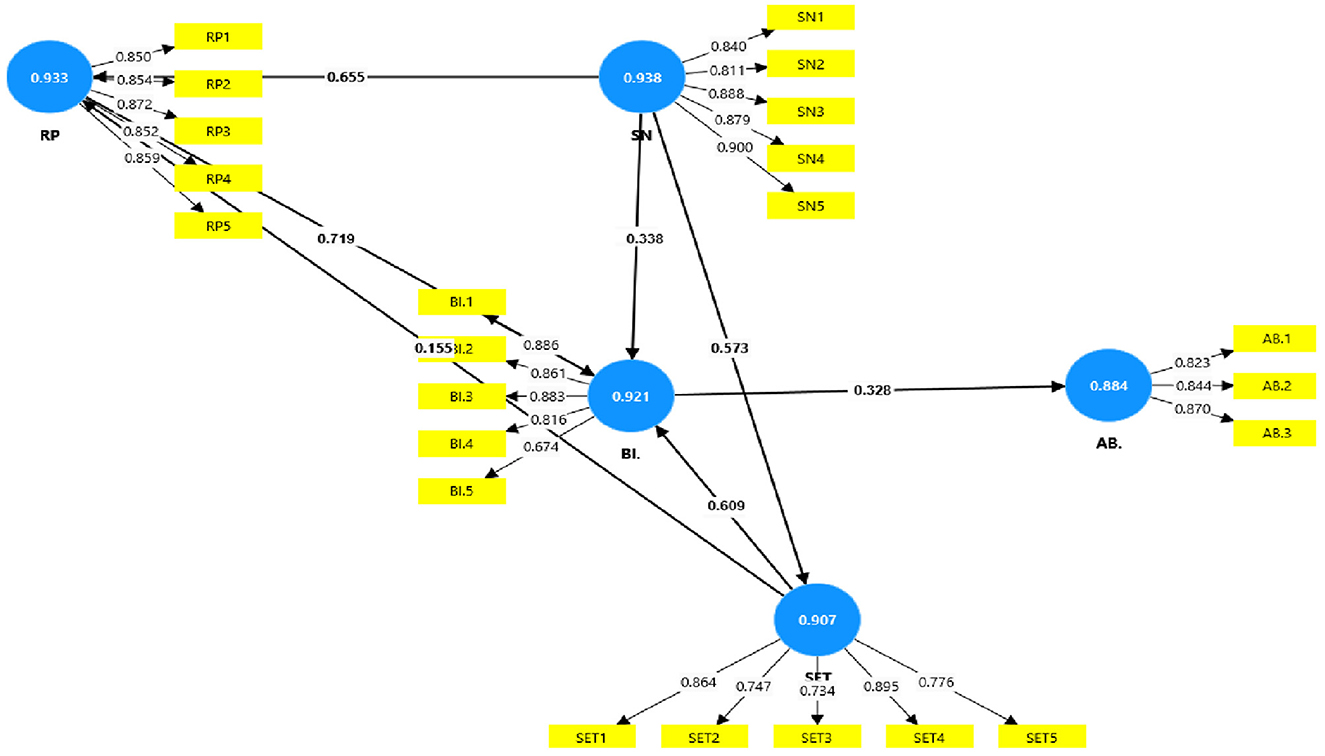
Figure 4. Modified PLS-SEM depicting interrelations between latent and manifest variables with factor loadings, path coefficients, and composite reliability (Source: Own calculation with SmartPLS 3). Circles are latent variables, rectangles are manifest variables. The numbers on the arrows from each latent variable to manifest variables are the factor loadings. The numbers on the arrows between the latent variables are the path coefficients. The numbers inside the circles represent composite reliability.
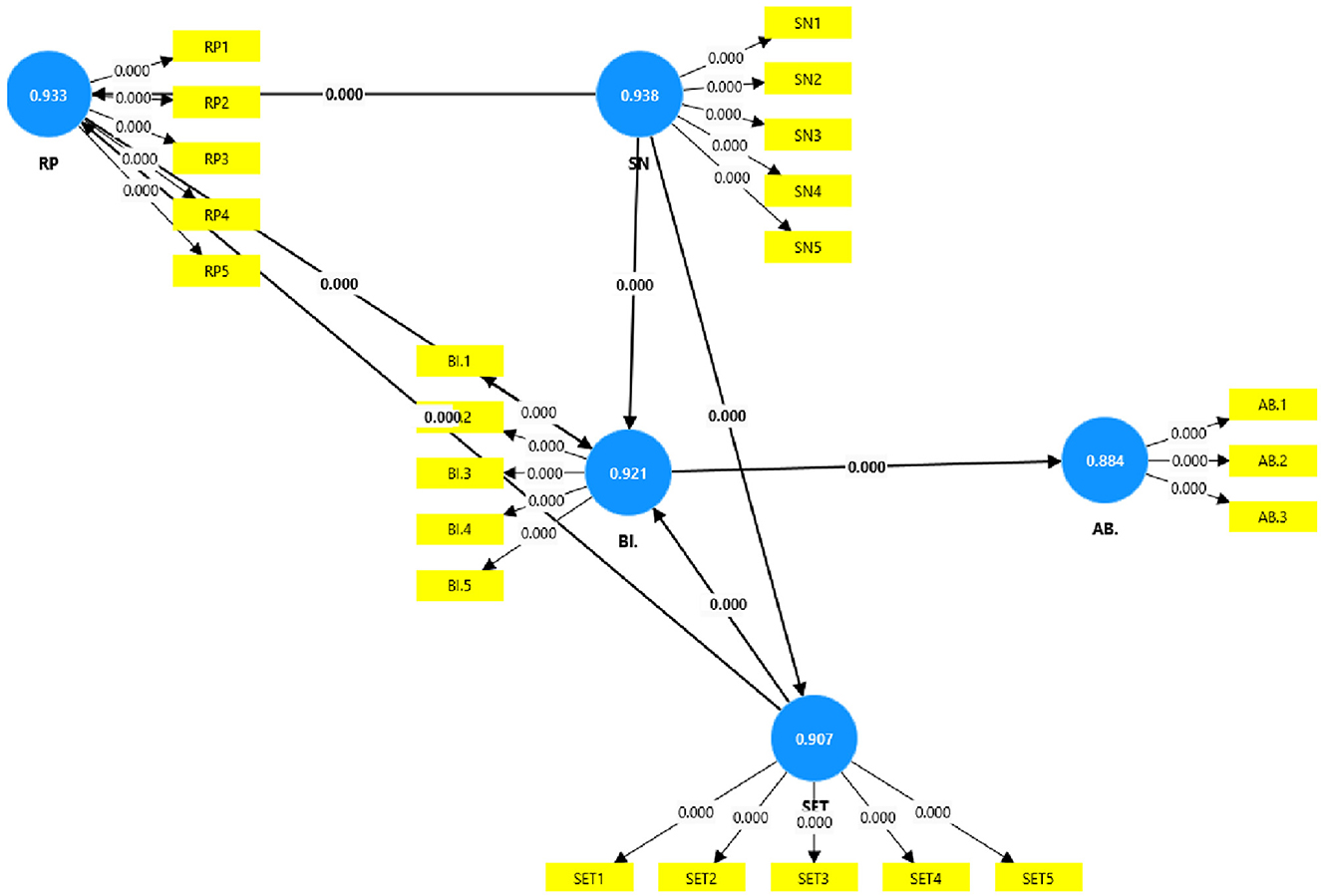
Figure 5. Modified PLS-PM depicting interrelations between latent and manifest variables with p-values and composite reliability. Source: Own calculation with SmartPLS 3. Circles represent latent variables, and rectangles represent manifest variables. The numbers on the arrows from each latent variable to the manifest variables, as well as between the latent variables, are p-values. The numbers inside the circles indicate composite reliability.
Figure 4 presents the modified PLS-SEM model, displaying the factor loadings, path coefficients, and composite reliability. In this diagram, circles represent the latent constructs such as BI, RP, Self-Esteem (SET), Social Network (SN), and AB, while rectangles denote the observed (manifest) indicators. The numbers on the arrows from each latent variable to its respective indicators reflect the standardized factor loadings, indicating how strongly each observed variable represents the construct. The arrows connecting the latent constructs show the path coefficients (β values), which denote the strength and direction of the relationships. Additionally, composite reliability values are shown within each circle, reflecting internal consistency for each construct.
A detailed examination of Figure 4 and Table 8 reveals that all seven hypothesized paths were statistically significant and positive. Behavioral intention significantly predicts AB (H1: β = 0.328, t = 101.236, p < 0.001), indicating that individuals with higher intention are more likely to adopt adaptive practices. Risk Perception strongly influences BI (H2: β = 0.719, t = 22.035, p < 0.001), suggesting that a heightened awareness of risk encourages a stronger motivation to act. Similarly, Self-Esteem also has a significant positive effect on BI (H3: β = 0.609, t = 34.558, p < 0.001), implying that individuals with higher confidence are more likely to intend adaptation.
The influence of Self-Esteem extends to RP as well (H4: β = 0.155, t = 10.372, p < 0.001), which suggests that people with stronger self-worth are more attuned to recognizing potential risks. Social Network plays a key role in shaping BI (H5: β = 0.338, t = 22.141, p < 0.001), likely due to the social influence, peer learning, and community-based interactions. Additionally, Social Network significantly impacts RP (H6: β = 0.655, t = 16.804, p < 0.001), indicating that interpersonal connections facilitate risk awareness through shared experiences. Finally, Social Network positively influences Self-Esteem (H7: β = 0.573, t = 21.985, p < 0.001), reinforcing the idea that social connectedness enhances psychological empowerment.
Figure 5 provides a complementary view of the structural model, where the p-values are indicated on the arrows connecting the constructs and their indicators. Like Figure 4, latent variables are represented as circles, and manifest variables as rectangles. Instead of path coefficients, this diagram highlights the statistical significance of the relationships using p-values, all of which are below 0.001, confirming the robustness of the model. The composite reliability values inside each circle remain consistent with those shown in Figure 4.
The results from Table 8 support the acceptance of all proposed hypotheses. Each of the seven relationships between constructs demonstrated high t-values and low p-values, indicating strong empirical support for the conceptual framework. Collectively, the structural model outlines a clear behavioral pathway wherein social networks not only enhance psychological traits like self-esteem and cognitive awareness such as RP but also strengthen BIs that ultimately lead to adaptive actions.
This comprehensive model highlights the importance of social and psychological factors in influencing AB. It underscores the foundational role of social networks in empowering individuals, fostering awareness, and shaping intentions toward adaptive responses. The consistent statistical significance across all pathways validates the theoretical assumptions and strengthens the relevance of the proposed model in understanding behavioral change.
5.3.1 Explanatory power
The explanatory power of the structural model was evaluated using the R-square (R2), Q-square (Q2), and effect size (F2) statistics, as presented in Table 9. These metrics provide insight into how well the model explains and predicts the endogenous latent constructs. The R2 values indicate the proportion of variance in the dependent constructs explained by the independent variables. The R2 values for AB, BI, RP, and Self-Esteem (SET) were 0.349, 0.530, 0.570, and 0.328, respectively. According to Cohen's (1988) criteria, these values can be interpreted as substantial, suggesting that the model demonstrates a good level of in-sample explanatory power for all four constructs. The overall model fit, as indicated by the Goodness of Fit (GoF) index of 0.537, further supports this conclusion and indicates a well-fitting structural model. Beyond explanatory power, the model's predictive relevance was assessed using the Q2 values. All endogenous constructs had Q2 values well above zero—specifically, 0.431 for AB, 0.338 for BI, 0.339 for RP, and 0.321 for SET—confirming that the model has acceptable and meaningful predictive relevance (Hair et al., 2017a). To better understand the contribution of each predictor, the effect sizes (F2) were examined. The largest effect was observed for the path from Social Network (SN) to RP, with an F2 of 0.671, indicating a very strong influence. Similarly, the paths from SN to Self-Esteem (F2 = 0.488) and from Self-Esteem to BI (F2 = 0.410) also demonstrated large effect sizes, highlighting these as the most impactful relationships in the model. In contrast, paths such as BI to AB (F2 = 0.034), SN to BI (F2 = 0.042), and SET to RP (F2 = 0.038) revealed small effect sizes, indicating limited individual contributions despite being statistically significant.
The findings suggest that social networks play a pivotal role in shaping both RP and self-esteem, which in turn substantially drive BIs. The pathway from BI to actual AB, though statistically significant, has a relatively smaller practical impact, suggesting the need for complementary factors or interventions to translate intention into consistent adaptive action.
5.4 Testing model fitness
Model fit was evaluated using two key indicators: the Standardized Root Mean Square Residual (SRMR) and the Normed Fit Index (NFI) as given in Table 10. The SRMR assesses the extent of discrepancy between the observed and model-implied correlation matrices. Values below 0.08 are generally accepted as indicative of a well-fitting model (Hu and Bentler, 1998). In this analysis, both the saturated and estimated models yielded SRMR values of 0.046 and 0.047, respectively—well within the acceptable range. These results suggest that the model demonstrates minimal residuals and thus a good fit to the observed data, supporting the appropriateness of the specified paths.
The NFI, an incremental fit index introduced by Bentler and Bonett (1980), compares the Chi-square value of the proposed model against a null model. An NFI score above 0.90 typically reflects acceptable model fit. The obtained values of 0.927 for the saturated model and 0.928 for the estimated model both exceeded this threshold, reinforcing the model's overall adequacy. Together, these indicators provide strong evidence that the structural model is both theoretically sound and statistically well-aligned with the empirical data.
6 Discussion
In the fragile socio-ecological landscape of Uttarakhand, the need for effective climate change adaptation strategies remains urgent. The region's vulnerability arises from its mountainous terrain, heavy dependence on agriculture, and increasing exposure to climate variability (Maikhuri et al., 2017; Sati, 2015; Kumar et al., 2021). These geographic and environmental constraints are further compounded by socio-economic transitions, which influence both the availability of resources and the agency of rural communities to adapt. Within this context, rural women emerge as central actors in climate resilience owing to their intimate engagement with agricultural practices and natural resource management. Despite persistent barriers—including limited access to technology, information, and decision-making forums—women in Uttarakhand have become key implementers of grassroots-level adaptation strategies (Sharma et al., 2019; Kori, 2024).
This study employed PLS-SEM using TPB framework to explore the underlying socio-psychological drivers of climate AB. The TPB framework posits that BI is shaped by three core constructs: PBC (operationalized as self-efficacy), SN, and attitudes or outcome expectations (represented by RP). PLS-SEM enabled the dissection of these latent constructs and their interrelations, offering a theoretically grounded and statistically rigorous approach to understanding rural women's AB (Al Mamun et al., 2023).
The empirical findings provide robust support for the hypothesized model, confirming the centrality of BI in predicting AB. Among the constructs, risk perception (RP → BI: β = 0.719) emerged as the most influential predictor of BI. This finding substantiates the TPB's assertion that behavioral expectations are significantly shaped by perceived outcomes, particularly in high-risk environments. In the context of Uttarakhand, climate-related threats such as glacial melt, flash floods, and crop failures have made these risks highly salient. However, it is not only awareness but also the immediacy and frequency of climate-related events that likely elevate perceived risk. This suggests that communication strategies should go beyond information dissemination to include experiential learning and localized narratives that heighten risk salience and contextual relevance.
Self-efficacy (SET → BI: β = 0.609) was another strong determinant of BI, reaffirming its importance in both TPB and social cognitive theory (Schwarzer and Fuchs, 1995). The positive relationship suggests that when women perceive themselves as capable of responding effectively to climate threats, they are more likely to form intentions to act. However, self-efficacy in this context is not a purely individual construct—it is shaped by access to resources, institutional support, and social networks. Therefore, efforts to enhance women's adaptive capacity must incorporate structural enablers such as land rights, financial inclusion, and access to extension services, which can convert perceived control into actual agency.
The role of SN was multifaceted. Social norms significantly influenced both BI (SN → BI: β = 0.338) and RP (SN → RP: β = 0.655), suggesting that individual adaptation is not only shaped by personal beliefs but also by the expectations and practices of the wider community. Furthermore, the strong relationship between SN and self-efficacy (SN → SET: β = 0.573) highlights the interdependence between perceived support and personal confidence. These findings indicate that rural women's adaptive behaviors are embedded within a network of collective meaning-making and social validation. In practical terms, this implies that adaptation interventions that leverage community platforms—such as women's self-help groups, cooperatives, and village institutions—are likely to yield more sustainable outcomes than those targeting individuals in isolation.
While BI was a significant predictor of actual behavior (BI → AB: β = 0.328), the effect size was modest (f2 = 0.034), pointing to a well-documented gap between intention and action in behavioral science literature. This gap may be attributed to a range of contextual barriers such as time poverty, gendered labor burdens, lack of institutional support, and entrenched social hierarchies. These findings suggest that while psychological readiness is necessary, it is not sufficient. The TPB, while valuable, may benefit from integration with complementary frameworks such as the Transtheoretical Model or Protection Motivation Theory to better account for constraints beyond volition.
The explanatory power of the model was substantial, with R2 values of 0.570 for RP, 0.530 for BI, 0.349 for AB, and 0.328 for SET. These figures confirm that the socio-psychological constructs account for a considerable portion of the variance in AB. The model fit was also confirmed through the SRMR (0.047) and NFI (0.928), indicating strong empirical alignment between observed data and theoretical expectations.
The effect size (f2) analysis further enriches the understanding of practical significance. Social norms exerted the strongest effects on RP (0.671) and self-efficacy (0.488), signaling that the influence of the community is both profound and multidimensional. Interestingly, SET → BI (f2 = 0.410) and RP → BI (f2 = 0.281) also had considerable effects, suggesting that both internal confidence and external threat perception play key roles in motivating intention. These results point toward the importance of dual strategies: one that enhances women's capacity to act (through skills, knowledge, and support), and another that enhances their motivation to act (by addressing perceptions of climate risk and urgency).
These findings align with global literature documenting the indispensable role of women in climate adaptation, particularly in ecologically vulnerable regions such as the Himalayas, Andes, and Pamirs (Wester and Lama, 2019; Goli et al., 2020; Prakash et al., 2024). Women's roles as custodians of agro-biodiversity and managers of natural resources position them at the forefront of adaptive strategies. However, our study provides a more granular understanding by demonstrating how variation in access to assets, education, and institutional support influences adaptation choices. Women with higher socio-economic status were found to adopt proactive and strategic responses, including technological innovations and diversification, while those from marginalized households tended to rely on reactive, short-term coping mechanisms (Ragasa et al., 2014; Najjar et al., 2023).
The intersection of gender, class, and institutional access highlights the inequitable distribution of adaptive capacity. As shown by Bhattarai et al. (2015) and Price (2018), systemic inequalities constrain marginalized women's ability to transform awareness into action. These findings suggest that climate adaptation policies must adopt a rights-based and intersectional approach, recognizing the differentiated needs and capacities of women based on their social positioning. Efforts to enhance ecological resilience through agro-biodiversity management and community-based adaptation must be complemented by measures that dismantle structural barriers, ensure gender-responsive governance, and build inclusive systems of support.
The use of PLS-SEM allowed for exploration of the interplay between cognitive, emotional, and social dimensions of AB. The model not only confirmed existing theoretical relationships but also revealed new pathways—particularly the mediating role of BI and the amplifying influence of SN. The insights generated highlight the value of integrating behavioral theory into climate adaptation research, especially in diverse and dynamic socio-ecological settings like Uttarakhand.
7 Conclusion and implication
This study provides critical insights into the socio-psychological underpinnings of climate ABs among rural women in Uttarakhand, highlighting the intersection of gender, environmental vulnerability, and behavioral intent. The study draws the TPB and reveals that women's ABs are shaped by a constellation of factors—most notably RP, self-efficacy, and SN. While women play a pivotal role in managing agro-ecological systems and sustaining household livelihoods, their adaptive responses are constrained by structural barriers such as unequal access to land, limited financial autonomy, and exclusion from formal decision-making processes. The study affirms that adaptation is neither uniform nor gender-neutral. Women with stronger risk awareness and higher self-efficacy were more likely to develop BIs that translated into adaptive practices. However, these behaviors were not realized equally across the population. Variations in adaptation are significantly influenced by socio-economic status, community support, and institutional exposure, making a strong case for intersectional and context-specific policy design.
8 Policy implications
Based on the empirical findings and structural relationships identified, several policy-level recommendations can be made:
1. Prioritize Risk Communication Strategies. Targeted information campaigns—tailored to women's cognitive and literacy levels—should be developed to enhance climate RP. Village-level demonstrations, community radio, and participatory extension services can build accurate threat awareness and motivate early adaptation planning.
2. Strengthen Women's Self-Efficacy through Capacity Building. The programs must invest in skill development, leadership training, and climate literacy to enhance women's confidence and perceived control over adaptive decisions. This includes training on sustainable farming practices, use of climate-resilient technologies, and resource management.
3. Institutionalize Gender-Responsive Resource Access Structural reforms are needed to improve women's access to land titles, agricultural credit, inputs, and market linkages. State-level schemes should earmark a minimum proportion of climate adaptation funds for women's collectives and self-help groups (SHGs).
4. Leverage SN through Community Structures Community-based adaptation platforms, such as Mahila Mandals and Farmer Producer Organizations (FPOs), can be harnessed to legitimize and promote adaptive behaviors. Interventions that celebrate local role models and facilitate peer-to-peer learning may shift prevailing SN in favor of women's participation.
5. Develop Differentiated Strategies for Marginalized Groups Adaptation programs must address intra-gender disparities. For instance, women-headed households, widows, and landless women should be prioritized for customized support packages that combine livelihood security with climate resilience measures.
6. Integrate Women's Voices in Climate Governance Policy frameworks should create institutional mechanisms—such as quotas in climate action committees and participatory vulnerability assessments—to ensure that women's experiences and insights directly shape adaptation planning at the local level.
9 Study limitations
While this study provides valuable insights, several limitations should be acknowledged:
• Context-Specific Scope: The analysis is limited to selected rural blocks in Uttarakhand and may not fully represent other agro-ecological zones or social groups.
• Cross-Sectional Design: Behavioral data were captured at a single point in time, limiting the ability to observe changes or causality across seasons or years.
• Self-Reported Measures: The use of self-report Likert scales may be subject to response bias, particularly in communities with strong social conformity.
• Male Exclusion: The exclusive focus on women precludes an understanding of intra-household negotiation and male influence on adaptive decision-making.
Data availability statement
The raw data supporting the conclusions of this article will be made available by the authors, without undue reservation.
Ethics statement
The studies involving human participants were approved by the Social Sciences Research Ethics Committee of the ICAR-Indian Agricultural Research Institute, New Delhi. The studies were conducted in accordance with local legislation and institutional requirements. The ethics committee/institutional review board waived the need for specific written informed consent procedures, as the research adhered to the principle of maintaining complete anonymity of participants. No personally identifiable information or photographs were collected during the study. Participants were informed about the purpose of the research, and their voluntary participation was obtained verbally.
Author contributions
SP: Conceptualization, Investigation, Methodology, Writing – original draft, Data curation, Formal analysis, Funding acquisition, Resources, Software, Validation, Visualization. RP: Conceptualization, Investigation, Methodology, Supervision, Validation, Writing – original draft. AS: Data curation, Formal analysis, Methodology, Software, Writing – original draft. RS: Writing – review & editing. GM: Writing – review & editing. SB: Writing – review & editing. BG: Writing – review & editing. MY: Writing – review & editing, Methodology. PV: Writing – review & editing. SR: Supervision, Writing – review & editing. PP: Supervision, Writing – review & editing. SG: Writing – review & editing. PY: Writing – review & editing. SM: Writing – review & editing. AR: Writing – review & editing. KS: Writing – review & editing. NJ: Writing – review & editing. SKB: Writing – review & editing.
Funding
The author(s) declare that no financial support was received for the research and/or publication of this article.
Conflict of interest
The authors declare that the research was conducted in the absence of any commercial or financial relationships that could be construed as a potential conflict of interest.
Generative AI statement
The author(s) declare that no Gen AI was used in the creation of this manuscript.
Publisher's note
All claims expressed in this article are solely those of the authors and do not necessarily represent those of their affiliated organizations, or those of the publisher, the editors and the reviewers. Any product that may be evaluated in this article, or claim that may be made by its manufacturer, is not guaranteed or endorsed by the publisher.
References
Abugre, S., and Sackey, E. K. (2022). Diagnosis of perception of drivers of deforestation using the partial least squares path modeling approach. Trees For. People 8:100246. doi: 10.1016/j.tfp.2022.100246
Adger, W. N., and Kelly, P. M. (1999). Social vulnerability to climate change and the architecture of entitlements. Mitig. Adapt. Strateg. Glob. Change 4, 253–266. doi: 10.1023/A:1009601904210
Ahmed, T., Klobas, J. E., Chandran, V. G. R., Akhtar, M. W., and Sergi, B. S. (2025). How perceived contextual barriers for entrepreneurship reduce entrepreneurial intentions: a TPB study. Int. Entrep. Manag. J. 21, 1–27. doi: 10.1007/s11365-024-01047-4
Ajzen, I. (1991). The theory of planned behavior. Organ. Behav. Hum. Decis. Process. 50, 179–211. doi: 10.1016/0749-5978(91)90020-T
Al Mamun, A., Naznen, F., Yang, M., Yang, Q., Wu, M., and Masukujjaman, M. (2023). Predicting the intention and adoption of wearable payment devices using hybrid SEM-neural network analysis. Sci. Rep. 13:11217. doi: 10.1038/s41598-023-38333-0
Arora, S., and Sahney, S. (2018). Antecedents to consumers' showrooming behaviour: an integrated TAM-TPB framework. J. Consum. Mark 35, 438–450. doi: 10.1108/JCM-07-2016-1885
Benitez, J., Henseler, J., Castillo, A., and Schuberth, F. (2020). How to perform and report an impactful analysis using partial least squares: guidelines for confirmatory and explanatory IS research. Inform. Manag. 57:103168. doi: 10.1016/j.im.2019.05.003
Bentler, P. M., and Bonett, D. G. (1980). Significance tests and goodness of fit in the analysis of covariance structures. Psychol. Bull. 88:588. doi: 10.1037/0033-2909.88.3.588
Bhattarai, B., Beilin, R., and Ford, R. (2015). Gender, agrobiodiversity, and climate change: a study of adaptation practices in the Nepal Himalayas. World Dev. 70, 122–132. doi: 10.1016/j.worlddev.2015.01.003
Bürkle, J. (2023). In-Between Masculinities and Femininities: A Study of the Gendered Identities of Male Environmentalists in Norway (Master's thesis). Bergen: The University of Bergen.
Carey, M., Jackson, M., Antonello, A., and Rushing, J. (2016). Glaciers, gender, and science: a feminist glaciology framework for global environmental change research. Prog. Hum. Geogr. 40, 770–793. doi: 10.1177/0309132515623368
Cohen, J. (1988). Statistical Power Analysis for the Behavioural Sciences, 2nd Edn. Hillsdale, NJ: Lawrence Erlbaum Associates.
Crenshaw, K. (1991). Mapping the margins: Intersectionality, identity politics, and violence against women of color. Stan. L. Rev. 43, 1241–1299. doi: 10.2307/1229039
Elkins, J. W. (2022). Extending the Theory of Planned Behavior for Organizations Using the Subjective Norms of Design Thinking: A Correlation-Comparative Mixed-Method Study. San Diego, CA: Northcentral University.
Fornell, C., and Larcker, D. F. (1981). Evaluating structural equation models with unobservable variables and measurement error. J. Mark. Res. 18, 39–50. doi: 10.1177/002224378101800104
Gansser, O. A., and Reich, C. S. (2023). Influence of the new ecological paradigm (NEP) and environmental concerns on pro-environmental behavioral intention based on the theory of planned behavior (TPB). J. Clean. Prod. 382:134629. doi: 10.1016/j.jclepro.2022.134629
Gautier, D., Denis, D., and Locatelli, B. (2016). Impacts of drought and responses of rural populations in West Africa: a systematic review. Wiley Interdiscip. Rev. Clim. Change 7, 666–681. doi: 10.1002/wcc.411
Goldman, M. J., Turner, M. D., and Daly, M. (2018). A critical political ecology of human dimensions of climate change: epistemology, ontology, and ethics. Wiley Interdiscip. Rev. Clim. Change 9:e526. doi: 10.1002/wcc.526
Goli, I., Omidi Najafabadi, M., and Lashgarara, F. (2020). Where are we standing and where should we be going? Gender and climate change adaptation behavior. J. Agric. Environ. Ethics 33, 187–218. doi: 10.1007/s10806-020-09822-3
Government of Uttarakhand (2016). Uttarakhand Human Development Report 2016: Realising Human Potential. Planning Department, Government of Uttarakhandin collaboration with the Institute for Human Development.
Gupta, H., Nishi, M., and Gasparatos, A. (2022). Community-based responses for tackling environmental and socio-economic change and impacts in mountain social–ecological systems. Ambio 51, 1123–1142. doi: 10.1007/s13280-021-01651-6
Hackfort, S., and Burchardt, H. J. (2018). Analyzing socio-ecological transformations–a relational approach to gender and climate adaptation. Crit. Policy Stud. 12, 169–186. doi: 10.1080/19460171.2016.1191363
Haeffner, M., Jackson-Smith, D., and Flint, C. G. (2018). Social position influencing the water perception gap between local leaders and constituents in a socio-hydrological system. Water Resour. Res. 54, 663–679. doi: 10.1002/2017WR021456
Hair, J. F., Hult, G. T. M., Ringle, C. M., and Sarstedt, M. (2017a). A Primer on Partial Least Squares Structural Equation Modeling (PLS-SEM), 2nd Edn. Los Angeles/Thousand Oaks, CA: SAGE Publications.
Hair, J. F., Hult, G. T. M., Ringle, C. M., Sarstedt, M., Richter, N. F., and Hauff, S. (2017b). Partial Least Squares Strukturgleichungsmodellierung: Eine anwendungsorientierte Einführung. Munich: Vahlen Verlag.
Hair, J. F. Jr., Hult, G. T. M., Ringle, C. M., and Sarstedt, M. (2014). A Primer on Partial Least Squares Structural Equation Modeling (PLS-SEM). Thousand Oaks, CA: SAGE Publications, Inc.
Hair, J. F. Jr., Hult, G. T. M., Ringle, C. M., Sarstedt, M., Danks, N. P., and Ray, S. (2021). “Evaluation of formative measurement models,” in Partial Least Squares Structural Equation Modeling (PLS-SEM) Using R: A Workbook (Cham: Springer International Publishing), 91–113.
Henseler, J., Hubona, G., and Ray, P. A. (2016). Using PLS path modeling in new technology research: updated guidelines. Ind. Manag. Data Syst. 116, 2–20. doi: 10.1108/IMDS-09-2015-0382
Hooman, H. A. (2014). Structural Equation Modeling With Lisrel Application. Tehran: SAMT Publication, Persian.
Hossain, M. A., Ahmed, M., Ojea, E., and Fernandes, J. A. (2018). Impacts and responses to environmental change in coastal livelihoods of south-west Bangladesh. Sci. Total Environ. 637, 954–970. doi: 10.1016/j.scitotenv.2018.04.328
Hu, L. T., and Bentler, P. M. (1998). Fit indices in covariance structure modeling: sensitivity to underparameterized model misspecification. Psychol. Methods 3:424. doi: 10.1037/1082-989X.3.4.424
Indian Space Research Organisation-National Remote Sensing Centre (ISRO-NRSC) (2023). Landslide Atlas of India: A Detailed Guide to Landslide Occurrences in India. Hyderabad, India: National Remote Sensing Centre, ISRO.
IPCC (2014). “Climate change 2014: synthesis report,” in Contribution of Working Groups I, II and III to the Fifth Assessment Report of the Intergovernmental Panel on Climate Change, eds. R. K. Pachauri and L. A. Meyer (Geneva: IPCC).
Kabeer, N. (2003). Gender Mainstreaming in Poverty Eradication and the Millennium Development Goals: A Handbook for Policy-Makers and Other Stakeholders. London: Commonwealth Secretariat. doi: 10.14217/9781848598133-en
Kaijser, A., and Kronsell, A. (2014). Climate change through the lens of intersectionality. Environ. Polit. 23, 417–433. doi: 10.1080/09644016.2013.835203
Kori, N. K. S. (2024). Strategies for Enhancing Women's Political Participation: Insights from Uttarakhand, India. Elsevier Inc. doi: 10.2139/ssrn.4851944
Kumar, P., Pandey, R., Fürst, C., and Joshi, P. K. (2021). The role of information infrastructure for climate change adaptation in the socio-ecological system of the Central Himalaya: availability, utility, and gaps. Socio-Ecol. Pract. Res. 3, 397–410. doi: 10.1007/s42532-021-00096-1
Leng, G. S., Lada, S., Muhammad, M. Z., Ibrahim, A. A. H. A., and Amboala, T. (2011). An exploration of social networking sites (SNS) adoption in Malaysia using technology acceptance model (TAM), theory of planned behavior (TPB) and intrinsic motivation. J. Internet Bank. Commer. 16, 1.
Maikhuri, R. K., Nautiyal, A., Jha, N. K., Rawat, L. S., Maletha, A., Phondani, P. C., et al. (2017). Socio-ecological vulnerability: assessment and coping strategy to environmental disaster in Kedarnath valley, Uttarakhand, Indian Himalayan Region. Int. J. Disaster Risk Reduct. 25, 111–124. doi: 10.1016/j.ijdrr.2017.09.002
Mollett, S., and Faria, C. (2013). Messing with gender in feminist political ecology. Geoforum 45, 116–125. doi: 10.1016/j.geoforum.2012.10.009
Najjar, D., Nyantakyi-Frimpong, H., Devkota, R., and Bentaibi, A. (2023). A feminist political ecology of agricultural innovations in smallholder farming systems: experiences from wheat production in Morocco and Uzbekistan. Geoforum 146:103865. doi: 10.1016/j.geoforum.2023.103865
Ngigi, M. W., Mueller, U., and Birner, R. (2017). Gender differences in climate change adaptation strategies and participation in group-based approaches: an intra-household analysis from rural Kenya. Ecol. Econ. 138, 99–108. doi: 10.1016/j.ecolecon.2017.03.019
Nunnally, J. C., and Bernstein, I. H. (1994). Psychometric Theory. New York, NY: McGraw-Hill Series in Psychology, 3.
Perez, C., Jones, E. M., Kristjanson, P., Cramer, L., Thornton, P. K., Förch, W., et al. (2015). How resilient are farming households and communities to a changing climate in Africa? A gender-based perspective. Glob. Environ. Change 34, 95–107. doi: 10.1016/j.gloenvcha.2015.06.003
Prakash, A., Ley, D., and Thamari, M. (2024). How gender-sensitive are environmental institutions, climate adaptation, and mitigation actions? A narrative from the Global South. Annu. Rev. Environ. Resour. 49, 449–474. doi: 10.1146/annurev-environ-121322-073202
Prasad, R. (2024). Exploring the Role of the Theory of Planned Behavior and the Intention-Behavior Gap in the Adoption of Products and Solutions by B2B Organizations: An Analysis of Organizational Culture as Moderators or Mediators (Doctoral dissertation). Malibu, CA: Pepperdine University.
Price, R. (2018). Women-Initiated Measures to Cope With Environmental Stresses and Climate Change in South Asia. K4D Helpdesk Report. Institute of Development Studies, Brighton, UK.
Ragasa, C., Sengupta, D., Osorio, M., Ourabah-Haddad, N., and Mathieson, K. (2014). Gender-specific approaches, rural institutions, and technological innovations. World Dev. 64, 146–162. Available online at: https://hdl.handle.net/10568/149452
Rakib, M. A., Islam, S., Nikolaos, I., Bodrud-Doza, M., and Bhuiyan, M. A. (2017). Flood vulnerability, local perception and gender role judgment using multivariate analysis: a problem-based “participatory action to Future Skill Management” to cope with flood impacts. Weather Clim. Extremes 18, 29–43. doi: 10.1016/j.wace.2017.10.002
Rawat, P. (2023). Study of Phytosociology, Management practices and Socioeconomic aspects of Agroforestry systems in Mori region of district Uttarkashi, Uttarakhand, India (Doctoral dissertation). College of Forestry, Ranichauri, Uttarakhand.
Raymond, C. M., and Robinson, G. M. (2013). Factors affecting rural landholders' adaptation to climate change: insights from formal institutions and communities of practice. Glob. Environ. Change 23, 103–114. doi: 10.1016/j.gloenvcha.2012.11.004
Sapry, H. R. M., and Ahmad, A. R. (2024). “Theory of planned behavior (TPB) and theory of reasoned action (TRA) in Halal technology study,” in Emerging Technology and Crisis Management in The Halal Industry: Issues and Recent Developments, eds. N. A. A. Rahman, and M. H. Ali (Singapore: Springer Nature Singapore), 67–81. doi: 10.1007/978-981-97-1375-2_5
Sati, V. P. (2015). Climate change and socio-ecological transformation in high mountains: an empirical study of Garhwal Himalaya. Change Adapt. Socio-Ecol. Syst. 2:1. doi: 10.1515/cass-2015-0005
Sati, V. P. (Ed.). (2020). “The climate of the Uttarakhand Himalaya,” in Himalaya on the Threshold of Change (Cham: Springer Nature), 21–38. doi: 10.1007/978-3-030-14180-6_2
Schwarzer, R., and Fuchs, R. (1995). “Changing risk behaviors and adopting health behaviors: The role of self-efficacy beliefs,” in Self-Efficacy in Changing Societies, eds. A. Bandura, G. H. Elder, Jr. A. Flammer, K. A. Schneewind, G. Oettingen, and M. Jerusalem (Cambridge: Cambridge University Press), 259–288. doi: 10.1017/CBO9780511527692.011
Seyyed Abbaszadeh, M., Amani Sari Baglou, J., Khazri Azar, H., and Pashavi, G. (2012). “An introduction to structural equation modeling in PLS and its application in behavioral sciences,” in Proceedings of the National Conference on Modern Research in Educational Sciences, 126–139.
Sharma, D., Khandekar, N., and Sachdeva, K. (2019). Addressing water-related shocks and coping decision through enhanced community participation: case studies from Ganga basin, Uttarakhand, India. Water Policy 21, 999–1016. doi: 10.2166/wp.2019.026
Shukla, R., Sachdeva, K., and Joshi, P. K. (2016). Inherent vulnerability of agricultural communities in Himalaya: a village-level hotspot analysis in the Uttarakhand state of India. Appl. Geogr. 74, 182–198. doi: 10.1016/j.apgeog.2016.07.013
Sultana, F. (2014). Gendering climate change: geographical insights. Prof. Geogr. 66, 372–381. doi: 10.1080/00330124.2013.821730
Sultana, R., Irfanullah, H. M., Selim, S. A., and Alam, M. S. (2023). Social-ecological vulnerability to climate change and risk governance in coastal fishing communities of Bangladesh. Front. Mar. Sci. 10:1174659. doi: 10.3389/fmars.2023.1174659
Thomas, K., Hardy, R. D., Lazrus, H., Mendez, M., Orlove, B., Rivera-Collazo, I., et al. (2019). Explaining differential vulnerability to climate change: a social science review. Wiley Interdiscip. Rev. Clim. Change 10:e565. doi: 10.1002/wcc.565
Van Valkengoed, A. M., and Steg, L. (2019). Meta-analyses of factors motivating climate change adaptation behaviour. Nat. Clim. Change 9, 158–163. doi: 10.1038/s41558-018-0371-y
Wardrop, J. L., and Loehlin, J. C. (1987). Latent variable models: an introduction to factor, path, and structural analysis. J. Educ. Stat. 12:410. doi: 10.2307/1165058
Wester, M., and Lama, P. D. (2019). “Women as agents of change?: reflections on women in climate adaptation and mitigation in the global north and the global South,” in Climate Hazards, Disasters, and Gender Ramifications (Abingdon: Routledge), 67–85. doi: 10.4324/9780429424861-4
Keywords: rural women, Uttarakhand, adaptation behavior, Theory of Planned Behavior, Partial Least Square Structural Equation Modeling
Citation: Pundir S, Padaria RN, S A, Singh R, Mahra GS, Bishnoi S, Ghosh B, Yeasin M, KV P, Rakshit S, Priyadarshani P, Gorai SK, Yadav P, Mukherjee S, Ranjan A, Shravani K, Jahan N and Bishnoi SK (2025) Exploring the socio-psychological drivers of climate adaptation among rural women in Uttarakhand: a TPB framework approach. Front. Sustain. Food Syst. 9:1558178. doi: 10.3389/fsufs.2025.1558178
Received: 09 January 2025; Accepted: 30 June 2025;
Published: 06 August 2025.
Edited by:
Eileen Bogweh Nchanji, International Center for Tropical Agriculture, KenyaReviewed by:
Kanika Pandey, G.B Pant University of Agriculture and Technology, IndiaKamlesh Kohli, Hemwati Nandan Bahuguna Garhwal University, India
Copyright © 2025 Pundir, Padaria, S, Singh, Mahra, Bishnoi, Ghosh, Yeasin, KV, Rakshit, Priyadarshani, Gorai, Yadav, Mukherjee, Ranjan, Shravani, Jahan and Bishnoi. This is an open-access article distributed under the terms of the Creative Commons Attribution License (CC BY). The use, distribution or reproduction in other forums is permitted, provided the original author(s) and the copyright owner(s) are credited and that the original publication in this journal is cited, in accordance with accepted academic practice. No use, distribution or reproduction is permitted which does not comply with these terms.
*Correspondence: Simran Pundir, c2ltcmFucHVuZGlyMDZAZ21haWwuY29t; Rabindra N. Padaria, cmFiaW5kcmFAaWFyaS5yZXMuaW4=; Aiswarya S., YWlzd2FyeWEuc0BpY2FyLmdvdi5pbg==; Bhaskar Ghosh, YnVtYmFkb25ib3NjbzQyMDFAZ21haWwuY29t
 Simran Pundir
Simran Pundir Rabindra N. Padaria
Rabindra N. Padaria Aiswarya S.
Aiswarya S. Rashmi Singh1
Rashmi Singh1 Girijesh Singh Mahra
Girijesh Singh Mahra Sitaram Bishnoi
Sitaram Bishnoi Bhaskar Ghosh
Bhaskar Ghosh Praveen K. V.
Praveen K. V. Sweety Mukherjee
Sweety Mukherjee Amandeep Ranjan
Amandeep Ranjan Kotha Shravani
Kotha Shravani